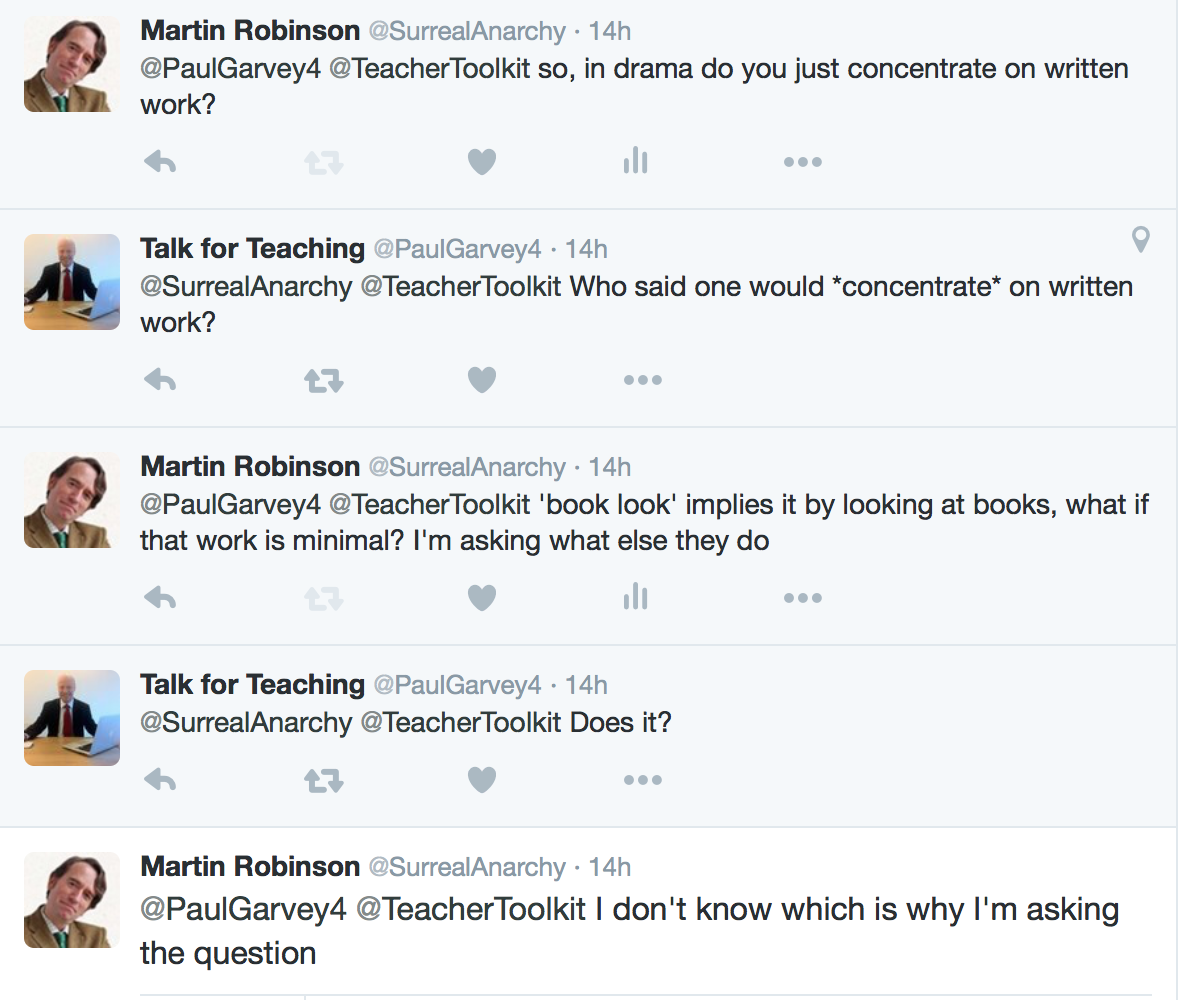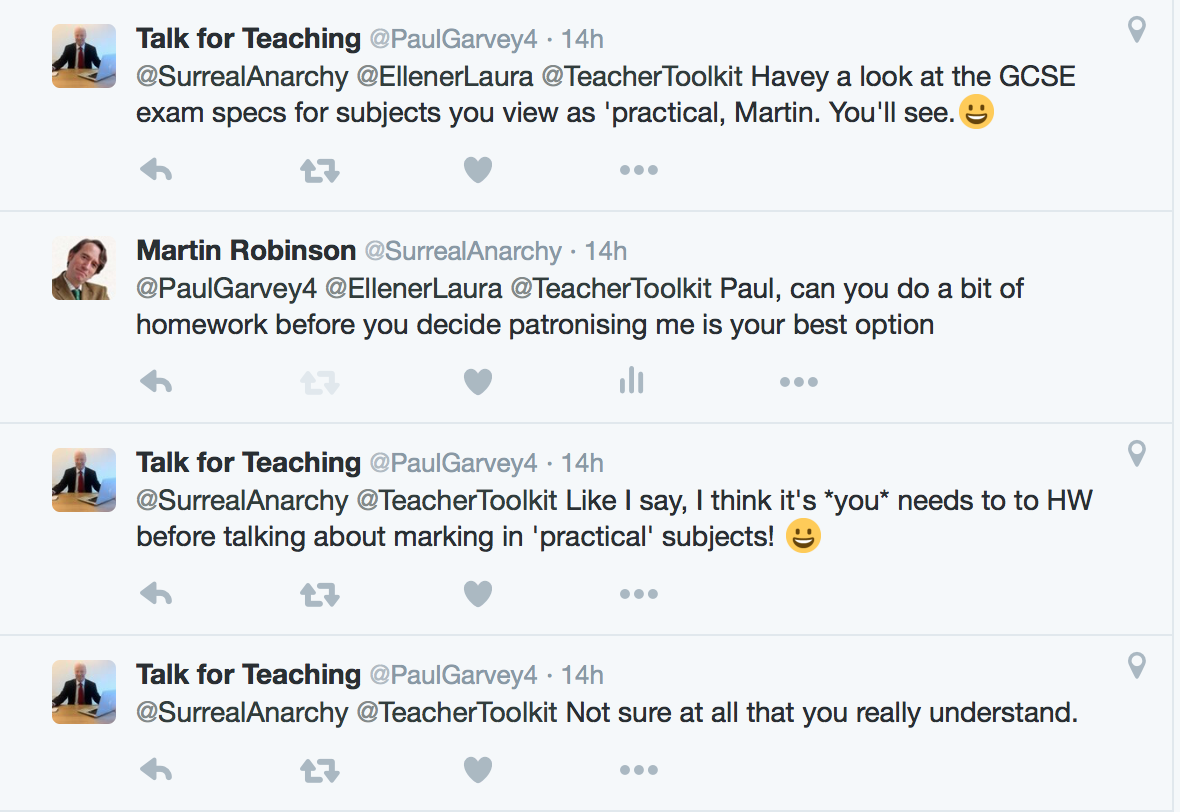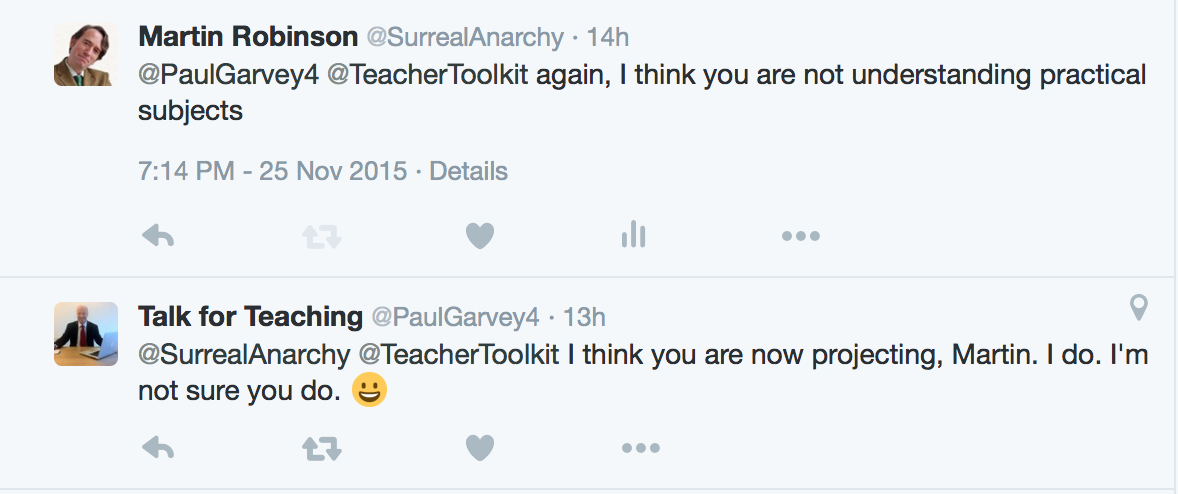Over a hundred years ago, the German poet Heine warned the French not to underestimate the power of ideas: philosophical concepts nurtured in the stillness of a professor’s study could destroy a civilisation. Isaiah Berlin
Yesterday I read a post by @teachertoolkit about a measure he employs in his school called ‘book look’. In his blog he wrote that the measure was to check on: “…marking, workload and quality assurance of feedback and assessment” As my main teaching subject is a practical one I thought I would ask the perfectly reasonable question:

My thought being that in subjects where much of the feedback, teacher, self and peer assessment is done verbally that instead of demanding those subjects should do unnecessary written work to fit in with the book look system, that the system might bend in a way to recognise the richness of this type of assessment.
Strangely, before I was able to receive an answer, this happened:

This was an odd diversion. Clearly Paul, who is an Ofsted inspector, had been into Teacher Toolkit’s school and had seen the ‘book look’ in practice, he implies here that he likes it. He also makes a leap from my tweet to imply that I meant practical subjects don’t mark. No matter, I had a right of reply:

And I expected it to be left there, after all, I was asking a question to which I hadn’t received an answer. My ulterior motive is to avoid subjects with a large practical component having to write everything down – where currently they are more effective by not having to log everything.

Now Paul has begun to question my understanding of ‘practical subjects’ – I have taught drama for twenty-five years, so this certainly ‘bristled’ with me. All I can think is that Paul is deliberately misunderstanding me because I’m asking about the practical component of practical subjects.

I know they all do written work. I am waiting for an answer from Mr. Toolkit about how they approach practical subjects, in other words do they want ‘everything’ logged in written form?

This is where things went mad and we went into meltdown. I had spent the day leading a course on the new exam specs for drama so Paul’s comment that I need to look at the exam specs was particularly hilarious.
The meltdown:


From this point the whole discussion went even further down hill, it is on twitter for those you who wish to see a spat about ‘you said this’, ‘you said that’.
There is something far more important going on here, the original book look idea is a bureaucrat’s dream but it falls apart when faced with practical subjects. Either it means that subjects with a sizeable practical component will be asked to do more, unnecessary, writing or the system that has been brought in will miss the feedback given verbally and understood physically in, say, drama and PE. Will this result in teachers at the school putting too much emphasis on written feedback and ignoring the richness of other ways of teaching and assessing?
Paul Garvey clearly thought I had no idea what I was talking about and the best I can think of him is that he misunderstood the nuance of my question. He seems to have a huge vested interest in ‘book look’. As a consultant he had visited Teacher Toolkit’s school and, as mentioned above:

has given ‘book look’ his blessing. As an Ofsted inspector his word carries power, I can see many schools jumping on the book look book check and adapting it for use in their schools. This would be a disaster for practical subjects and, I would venture, for all subjects. Read this excellent blog from Greg Ashman where he examines the thinking behind ‘book look’.
Since I pointed out the problem with practical subjects Teacher Toolkit has removed the bit of the blog where he wrote about checking: “…marking, workload and quality assurance of feedback and assessment” maybe because it doesn’t work for a large part of the feedback that is done in practical subjects. However, the tool doesn’t cover practical elements.

The ‘yellow box’ areas don’t help for practical work – how could a ‘diagnosis’ of books pick up the improvement in a girl’s ball skills in football or a boy’s vocal quality in drama unless it is written down? The point is the writing down of these things interrupts the teaching of these things in the subject, slows them down, and, in all likelihood, lowers the standards of teaching and learning in the practical element of practical subjects. By writing about your practical work, you cease to truly understand it. It would be like teaching a child to walk by insisting she wrote all the stages down, set targets etc. when, in real life, the understanding of how to do these things is quite mysterious to us. Each child is different, they respond, in practical work, to coaching in real time, not to stopping and starting and writing about it.
That this check seems to expect teachers to spend a lot of time giving written feedback, and what is assessed will be what is done, I think the above book checking tool will mean that staff will have to spend more and more effort and time with written work and feedback and reduce the time and the quality of verbal feedback. This excellent blog by Andy Day reflects on how these checks distort education. What a pity to put all the effort into written feedback especially if verbal feedback is a far more effective method of raising standards.
Ideas nurtured in the stillness of a senior leader’s study could destroy the quality of education in a school. Unnecessary writing of targets etc. is the bane of practical work please stop it happening in schools just so that a leadership team needing something to do can check it and Ofsted inspectors needing to justify their consulting business sidelines can tweet about it. Hopefully the book look tool will ignore practical work and, maybe, ignore books.
Leave a comment